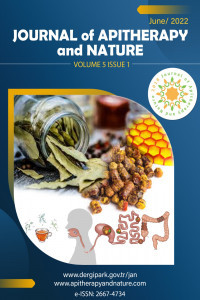Karadeniz arısı zehrinin pankreas kanseri üzerinde uzun vadede sitotoksik etkisinin araştırılması
Arı zehri, çeşitli hastalıkların tedavisinde kullanılan doğal ürünlerden biridir. Arı zehrinin çok sayıda kanser hücresi üzerindeki sitotoksik etkisi, farklı araştırma grupları tarafından ortaya çıkarılmıştır. Bu in vitro çalışmalar, prensip olarak çeşitli inkübasyon sürelerinde farklı arı zehri konsantrasyonlarını kullanarak sitotoksisite analizlerinin uygulandığı çalışmalardır. Alandaki ortak yaklaşım, bu uygulanan şartlar içinde en etkili sitotoksik koşulları belirlemektir. Farklı olarak, bu çalışmada Karadeniz ırkı Apis mellifera’dan elde edilen zehrin sitotoksik etkisinin, arı zehri ile bir süre inkübasyondan sonra hücrelerden uzaklaştırılması halinde bile sitotoksik etkisinin devam edip etmediği sorusu üzerine odaklanılmıştır. Bu amaç doğrultusunda AR42J pankreas kanseri hücrelerinde en etkin koşullar belirlendi ve arı zehrinin belirlenen bu konsantrasyonlarda ortamda olmadan uzun sürebilen etkisi araştırıldı. Bulgular, arı zehrinin sitotoksik etkisinin arı zehri ile bir kere muamele edilen hücrelerde dahi devam ettiğini göstermiştir. Bulgularımız arı zehri kaynaklı hücre ölümünün, popülasyondaki hücreler tarafından bir şekilde hafızaya alınabileceğini ya da arı zehrinin uzun bir süre boyunca meydana gelen apoptozis yolağını tetikleyebileceğini göstermektedir. Ancak ileri araştırmalara ihtiyaç vardır.
Anahtar Kelimeler:
arı zehri, sitotoksisite, kanser, AR42J hücreleri
Investigation of long-term effect of Black Sea bee’s venom on the cytotoxicity of pancreatic cancer cells
Bee venom is one of the potential natural mixtures to be used in therapies of a range of diseases. The cytotoxic effect of bee venom on a number of cancer cells has been revealed by different research groups. These in vitro studies are designed to include serial concentrations of bee venom under various incubation times, followed by the application of cytotoxicity assays. Common approach in the field is to determine the most effective cytotoxic conditions within those experienced. Differentially, in this study we aimed to understand whether the cytotoxic effect of venom obtained from Black sea Apis mellifera has been remained even if bee venom was removed after a while of incubation. For this aim, the conditions were determined in AR42J pancreatic cancer cells and the prolonged effect of bee venom under the determined concentrations was investigated. The findings showed that the cytotoxic effect of bee venom still continued in cells treated with bee venom once. This suggests that bee venom-induced cell death can be memorized by the cells in population somehow or/and bee venom may provoke a cascade of apoptosis occurring in a long time. This however needs further investigations.
Keywords:
bee venom, cytotoxicity, cancer, AR42J cells,
___
- Danneels, E. L., Van Vaerenbergh, M., Debyser, G., Devreese, B., & de Graaf, D. C. (2015). Honeybee Venom Proteome Profile of Queens and Winter Bees as Determined by a Mass Spectrometric Approach. Toxins, 7(11), 4468-4483. doi:10.3390/toxins7114468
- Jamasbi, E., Lucky, S. S., Li, W., Hossain, M. A., Gopalakrishnakone, P., & Separovic, F. (2018). Effect of dimerized melittin on gastric cancer cells and antibacterial activity. Amino Acids. doi:10.1007/s00726-018-2587-6
- Jo, M., Park, M. H., Kollipara, P. S., An, B. J., Song, H. S., Han, S. B., . . . Hong, J. T. (2012). Anti-cancer effect of bee venom toxin and melittin in ovarian cancer cells through induction of death receptors and inhibition of JAK2/STAT3 pathway. Toxicology and Applied Pharmacology, 258(1), 72-81. doi:10.1016/j.taap.2011.10.009
- Park, M. H., Choi, M. S., Kwak, D. H., Oh, K. W., Yoon, D. Y., Han, S. B., . . . Hong, J. T. (2011). Anti-Cancer Effect of Bee Venom in Prostate Cancer Cells Through Activation of Caspase Pathway Via Inactivation of NF-kappa B. Prostate, 71(8), 801-812. doi:10.1002/pros.21296
- Tu, W. C., Wu, C. C., Hsieh, H. L., Chen, C. Y., & Hsu, S. L. (2008). Honeybee venom induces calcium-dependent but caspase-independent apoptotic cell death in human melanoma A2058 cells. Toxicon, 52(2), 318-329. doi:10.1016/j.toxicon.2008.06.007
- Yang, Z. L., Ke, Y. Q., Xu, R. X., & Peng, P. (2007). Melittin inhibits proliferation and induces apoptosis of malignant human glioma cells. Nan Fang Yi Ke Da Xue Xue Bao, 27(11), 1775-1777.
- Zheng, J., Lee, H. L., Ham, Y. W., Song, H. S., Song, M. J., & Hong, J. T. (2015). Anti-cancer effect of bee venom on colon cancer cell growth by activation of death receptors and inhibition of nuclear factor kappa B. Oncotarget, 6(42), 44437-44451. doi: 10.18632/oncotarget.6295
- Yayın Aralığı: Yılda 2 Sayı
- Başlangıç: 2018
- Yayıncı: Oktay YILDIZ
Sayıdaki Diğer Makaleler
Karadeniz arısı zehrinin pankreas kanseri üzerinde uzun vadede sitotoksik etkisinin araştırılması
Selcen ÇELİK UZUNER, Sinan TETİKOĞLU, Esra BİRİNCİ, Aytan ADİLOVA
Gulsum Merve TURKUT, Mehtap ER, Atiye DEGIRMENCI
Anticancer Properties of Krill Oil
Hande ÇEKİCİ, Yunus Emre BAKIRHAN
Investigation of biochemical usefulness of tea(Camellia sinensis )flower
Fatma YAYLACI KARAHALİL, Zehra CAN
